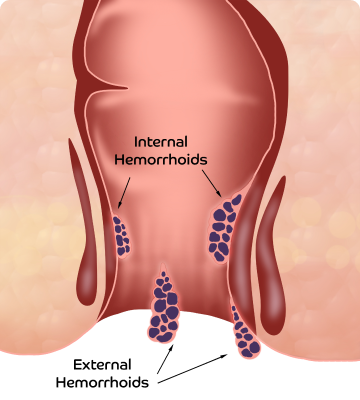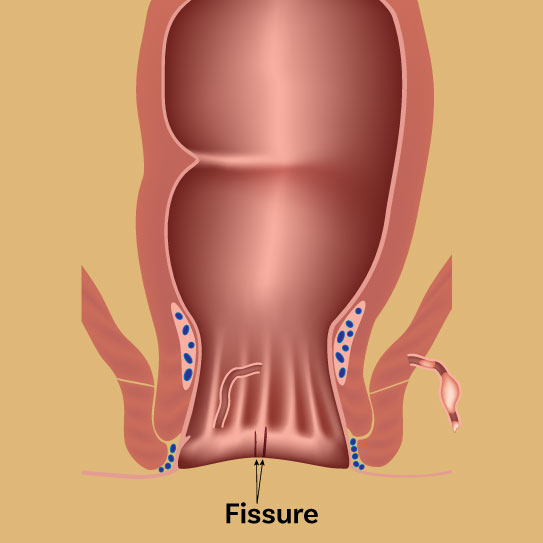Forget the pain of anal fissure with modern treatment at Pristyn Care
An anal fissure is a tear which can occur in the anus that extends to the anal canal. Fissures are a condition of the anus and anal canal and are responsible for over 10% to 15% of the visits to a colon and rectal surgeon in Bhubaneswar. Based on a study conducted in Odisha, the chances of getting a fissure in men and women are equal irrespective of the age.
Fissure causes pain during bowel movements and the most common cause of rectal bleeding in infancy. If you are noticing symptoms of fistula, get the most advanced laser-based surgical treatments at Pristyn Care Laser Clinic.
Advanced treatments at Pristyn Care
We offer treatments which ensure faster healing, long-lasting results, and are minimal pain, also involves fewer cuts/incisions. The modern procedure is performed by the best doctors at Pristyn Care in Bhubaneswar.
Based on another study, people ranging from 35-65 years of age are more susceptible to fissure. Among the patients, over 55% were males and 45% were females. Given the food choices of the city, which is fish and other meat products which has no dietary fiber, the prevalence of fissure in people is not surprising.
This calls for an advanced and latest treatment solution which not heals faster but lets you get back in a routine within a week. If you are experiencing symptoms of fissure or taking old treatments, not getting any relief, make an appointment with the best doctor in Bhubaneswar.
How do you know if you have anal fissure?
You can look for symptoms below and identify the condition:
- Pain in the rectal area during, and after a bowel movement
- Chronic constipation
- Blood on the outside surface of the stool
- Blood on toilet tissue when you wipe
- A visible tear in the anal canal
- Irritation and itching that may be painful
- Discomfort when urinating, frequent need to go, or inability to urinate
- Foul-smelling discharge
How to relieve fissure itching?
Here are a few simple tips that can help you relieve fissure itching:
- Don’t scratch the fissure area. Scratching may irritate the skin. To find relief from the condition, you can apply compression to the area or take an oatmeal bath. You may want to scratch the area while in your sleep, so you should trim your nails to prevent hurting your area.
- Wear breathable cotton underwear. Wearing cotton undergarments will help you keep your area dry. Avoid wearing pantyhose and tight fit inner garments because it may trap moisture and irritate the skin.
- Clean your anal area gently – Use clean lukewarm plain water to your clean your anus. Use non-irritating mild soap. Do not scrub the area near your anal fissure. Make sure to clean the area with moist cotton balls or plain water if you have diarrhea or incontinence.
- Avoid irritants – Do not use anything like perfumed soaps, bubble baths, genital deodorats, or harsh wipes in and around your anal fissure. If you need to clean your fissure area, use unscented toilet paper.
- Watch your diet – Cut down on your intake of coffee, cola, spicy foods, citrus fruits, tomatoes or any food that may cause diarrhea. Don’t indulge in laxative overuse
- Use gels and ointments – You can use zinc oxide gels or ointments, vaseline petroleum jelly or hydrocortisone cream to find quick relief from the itching and irritating symptoms.
- Maintain firm bowel movements – Adding a lot of fiber to your regular diet can help you pass soft and timely bowel movements. For smooth bowel movements, you can also take help of fiber supplements such as psyllium (Metamucil) and methylcellulose (Citrucel).
What is the difference between anal fissure and anal fistula?
Anal fissure and anal fistula are two very common anorectal diseases. An anal fissure is a condition where an tear or a crack appearns in the skin near the anus. On the other hand, anal fistulas are tube-like passages that appears in the anal canal or the inner rectum. Most anal fissures are like paper cuts and ususally get healed within a few weeks. If left untreated, both anal fissure and anal fistula can develop into worse conditions. Untreated fistulas can even branch off into multiple openings.
The symptoms exhibited by both the conditions are very similar to each other. Pain in the anal area, discomfort while seating at the toilet seat and pain while passing a bowel movement, and blood in stools are some of the common symptoms for both anal fissure and anal fistula. But anal fistulas may also include pus secretion from the anal area, an extra opening near the anus or an increase in diarrhea.
Although different in nature, both the conditions require medical intervention. An anal fissure or anal fistula can be treated by a proctologist or an anorectal/ colorectal surgeon. At initial stages, both the diseases can be managed with medicines. But to treat the condition permanently, one would require a surgical approach, which can be done either through open surgery or laser surgery.










Pristyncare%20Clinic.webp)
.svg)









